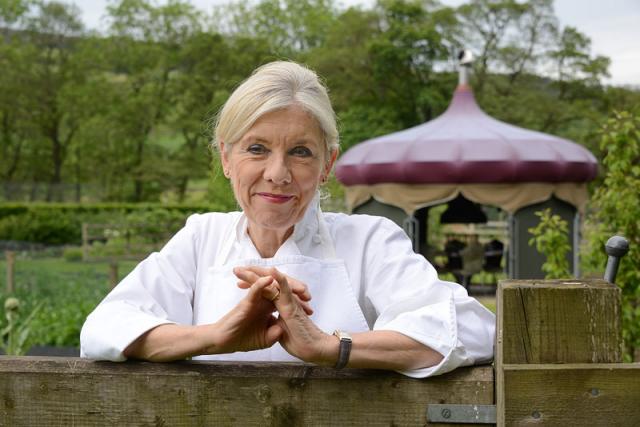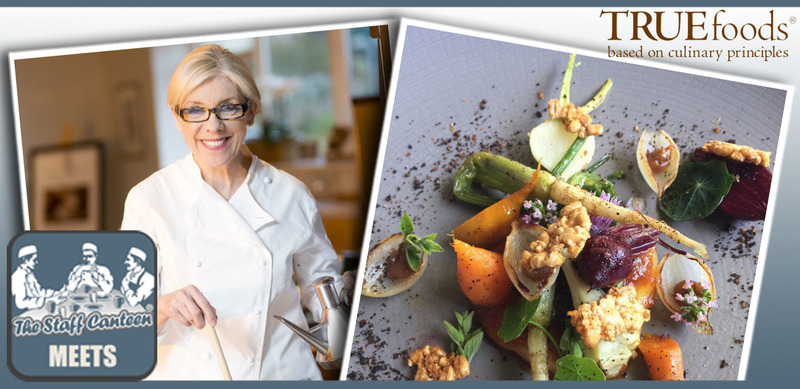Frances Atkins, Chef Patron, The Yorke Arms
Originally from Ilkely in Yorkshire, Frances Atkins always knew she wanted to cook. She started as a pot wash at Michelin-starred The Box Tree where she then became a chef.
Despite having a hard time as the only woman in the kitchen she has continued her career and is now chef patron of The Yorke Arms in the Yorkshire Dales. Her style has evolved considerably and the restaurant has been in the Michelin Guide with one star for 13 years.
The Staff Canteen took a trip to this idyllic restaurant with rooms and spoke to Frances about being your own boss, the lack of commitment in young chefs now and how if she could have her time again she would definitely learn the trade in a professional kitchen rather than being self-taught.

No, because in actual fact I don’t want to play if it does! I would think it’s the other way round really. I’ve never lost sight of why I still do the job, and cooking is the bit I enjoy.
As you said cooking is the bit you enjoy, what drew you into the kitchen in the first place?
Like a lot of chefs I always wanted to cook from being a child – I never wanted to do anything else. My first job as a kid was washing up at The Box Tree and it was very inspirational. There was a lot romance about the kitchen at that time and food was having a big change. There was a revolution in our country of good food and good wine – I got swept away by it all.
What was it like at a young age being the only woman in the kitchen?
I had quite a hard time, the boys at the end of each week would haul me up into their office and list all of the mistakes I had made that week, and tell me they would take it off my wages if I did it again. I don’t know if it was just me but it was a very male orientated business.
You took a step back from the industry when you were 23, what was the reason and did you find it hard to come back?
I got married and had quite a difficult time. It wasn’t my choice not to work and I was desperate to start working again. I was still cooking, I did a lot of entertaining so I would do three dinner parties a week – nowadays you could make a living out of that, but I think it’s a shame people would rather do that than work the hours in a busy kitchen. I started working full time again when I was 32, I began delivering food to pubs and that turned into an outdoor catering business.
I got enough money together to get a 20 seater restaurant in Buckinghamshire and a bike, I would do as much mise en place as I could at home and then load it onto my bike and take it to the restaurant!
Then I got enough money to get a kitchen – the whole thing was piecemeal really. It was great fun, we sold it three years later and bought The Plough at Speen – that’s where I met Heston (Blumenthal).
>>> Read more about Heston here
Was this before Heston was a chef himself?
His family used to come for dinner, it was just before he went into the business. We went to his house a few times and he was always cooking, his food was always extraordinary. I was very privileged really to have had that experience.
You mentioned you don’t think chefs want to do the hours in the kitchen anymore, is that something you find when you take on young chefs?
The margin is very small in the restaurant business so its really down to menu planning – you are not necessarily doing the food you would like to produce you are having to do the food which is economically sound which suits your clientele and your business.
We’ve also changed from seven days to five again to keep the working hours of my staff down.
They have been with me a long time, John our front of house manager I’ve worked with since he was 19 and he is now 40, Roger Olive, my head chef has been with me for 14 years – they are The Yorke Arms team.
From the 20 seater restaurant in Buckinghamshire you have since owned a Farleyer House, a hotel in Perthshire, Scotland and opened Tate & Lyle’s Shaw Restaurant in London. What made you want to return to Yorkshire and take on The Yorke Arms in 1997?
I thought it would be wonderful to have idyllic place in the middle of now where which is why we bought Farleyer House but we couldn’t sustain it so we came back to my roots. When we came here it was just a local pub, and we turned it into a brasserie while we got the money together to do the rooms, improve the kitchen and add staff accommodation. We’ve built it up but there is still lots left to do….maybe someone else will do that!
Starting as a brasserie your food has obviously evolved since the beginning?
Totally, when I came here I thought ‘I’m just going to cook without pressure’, it was my little dream and I enjoyed it. Slowly it developed and the more you cook, the more you develop yourself - as you will see in many chefs. We added the rooms and we needed the space to do that so we had to condense our dining, it had to become, in a sense, a little more sophisticated than what we were doing. In one sense the building has dictated the style of food that we have produced.
Are there still dishes from your original brasserie on the menu today?
Oh yes, we were doing black pudding cooked in brioche and using a lot of pulses – we were trying to appeal to a whole market.
We still do fish and chips on our lunchtime menu, although they are good and the fish is brill. On an evening we offer five and eight course tasting menus plus an ala carte, we have to as we have guests who stay for two or three nights.
If anything now I’d say my food is erring back to relatively simple and fresh.
You’re self-taught is that right?
Yes, I haven’t been in any grand kitchens with any grand chefs unfortunately!
Does that make it easier to find your own style?
No. If I had my time again I’d love to go into a kitchen with a good chef, most definitely. It develops your style much quicker. Being self-taught, you have to learn the hard way, make your own mistakes and it’s much more frustrating. You can learn so much from other chefs.
It’s a surprise tasting menu and at the minute you can expect to see something like the halibut or langoustine, we’ve got a super miso with all the veg from the garden.
Do you enjoy being able to just give customers what you want?
Yes I do. I think it’s more exciting for the guest. We take a list of stuff they don’t like and do like, and because there is no preconceived idea from the guest point of view about what they are going to get. So many guests have said to me they have eaten food they would never normally try and that it’s been wonderful. It’s not about us thinking what can we give them, these dishes, as with any good kitchen, are tried and tested. They can also be easily modified for allergies, we are cooking for them and that’s what you have to do today.
Has the amount of guests with allergies risen?
Totally, over the last two or three years. And it used to be guests would say they want the peas from that dish and the potatoes from another – this way as a chef I know what they can’t have, I can adapt the dish and it can be served with the skill and flare that it’s supposed to have.
You have the kitchen garden, have you always had it and does it inspire your dishes?
We had a little one but this one is new and has got bigger and bigger - I don’t think we can make it any bigger though as the patch next to it is where the helicopters come in. It definitely inspires me, I thought the other day I wish I had grown more artichokes because they are delicious but there are not enough to make the dish I would like.
Do you have a favourite season and dish?
We are big into game and I’m quite well known for my grouse. Last year I think we sold about 5000 grouse.
You’ve had a Michelin star for the 13 years – was that an accolade you were aiming for?
It was an aim when I had my first little restaurant but I hadn’t really bothered about it when I came here, I was just into lifestyle. It was a lovely surprise – when I was told, I thought somebody was taking the piss!
You are one of just a handful of female chefs who have Michelin stars, why do you think there are so few?
There are tonnes of good female chefs knocking around, I think traditionally there has just been a bit of a shortage but I think that is being rectified now. I don’t think it’s as male dominated anymore and I think you’ll see a great batch of women coming along soon. Society has changed, so now it’s possible.
For me getting people to work for me was the hardest thing, I hadn’t come out of a good stable and a lot of chaps didn’t like working for women. But at the end of the day if you go forward with a positive attitude you will get there.
I’d like to see more people sticking at it. I think a lot of people flirt with it and then find easier ways of earning a living.
I’m quite involved with Middlesbrough college which is great, lecturers come and do a stint in our kitchen so they are then passing on knowledge they have got from us to the student rather than just working from a text book.
We also have a young girl in the kitchen with us who was a waitress and she works so hard so I’m sure she will succeed. It’s very rewarding seeing somebody blossom who has come through your kitchen, it’s terrific.
You’ve been here 18 years, what are your plans for the future?
To try and find the time to keep doing it all!


{{user.name}}